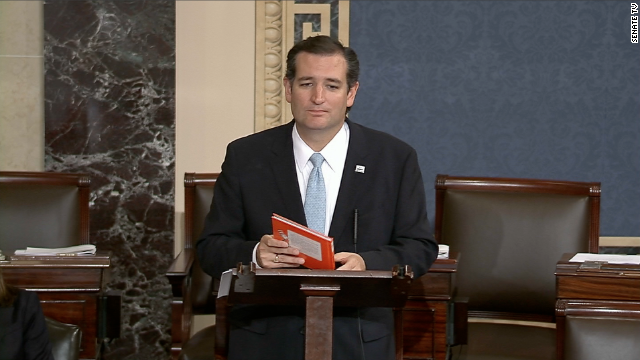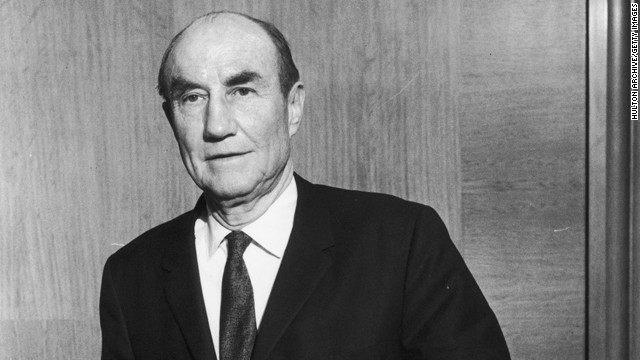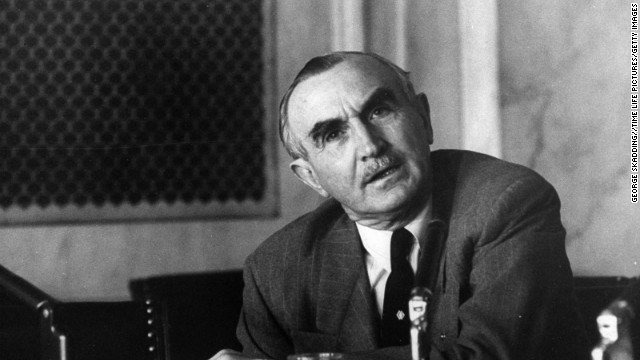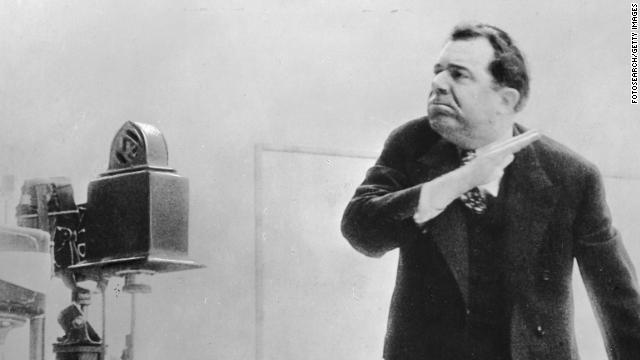- Back to Home »
- What the Ted Cruz spectacle is all about
 Almost 22 hours after he started, Republican Sen. Ted Cruz of Texas finally ended his oral assault on Obamacare on Wednesday, September 25. His all-night speech blended political rhetoric and emotional pleas for all of his GOP colleagues to join him in blocking any government funding for the health care reforms.Technically, Cruz's remarks did not constitute a filibuster. A filibuster is a tactic used to delay or block a vote on legislation or an appointment. Lawmakers can keep a debate going without interruption indefinitely. They don't have to specify what they are filibustering but must keep speaking or, in the case of one senator on the list, singing. Here are some of the most memorable and longest filibusters in Senate history.
Almost 22 hours after he started, Republican Sen. Ted Cruz of Texas finally ended his oral assault on Obamacare on Wednesday, September 25. His all-night speech blended political rhetoric and emotional pleas for all of his GOP colleagues to join him in blocking any government funding for the health care reforms.Technically, Cruz's remarks did not constitute a filibuster. A filibuster is a tactic used to delay or block a vote on legislation or an appointment. Lawmakers can keep a debate going without interruption indefinitely. They don't have to specify what they are filibustering but must keep speaking or, in the case of one senator on the list, singing. Here are some of the most memorable and longest filibusters in Senate history.  24 hours, 18 minutes: Sen. Strom Thurmond of South Carolina holds the record for the longest filibuster when he took to the floor to oppose the Civil Rights Act of 1957. One of the ways the segregationist Republican filled his time was by reading the election laws of every state.
24 hours, 18 minutes: Sen. Strom Thurmond of South Carolina holds the record for the longest filibuster when he took to the floor to oppose the Civil Rights Act of 1957. One of the ways the segregationist Republican filled his time was by reading the election laws of every state.  22 hours, 26 minutes: Sen. Wayne Morse was considered "The Tiger of the Senate" by his admirers. He abandoned the Republican Party and became an Independent because of President Dwight Eisenhower's decision to choose Richard Nixon as his running mate. In 1953, Morse filibustered Tidelands Oil legislation, which was the record until Thurmond broke it in 1957.
22 hours, 26 minutes: Sen. Wayne Morse was considered "The Tiger of the Senate" by his admirers. He abandoned the Republican Party and became an Independent because of President Dwight Eisenhower's decision to choose Richard Nixon as his running mate. In 1953, Morse filibustered Tidelands Oil legislation, which was the record until Thurmond broke it in 1957.  18 hours: Sen. Robert La Follette Sr. was a progressive Republican who often championed causes of the working class and working poor. Like others on this list, La Follette knew how to attract attention. For instance, his 18-hour filibuster in 1908 stood as the record until Morse outlasted him 45 years later.
18 hours: Sen. Robert La Follette Sr. was a progressive Republican who often championed causes of the working class and working poor. Like others on this list, La Follette knew how to attract attention. For instance, his 18-hour filibuster in 1908 stood as the record until Morse outlasted him 45 years later.  16 hours, 12 minutes: In 1981, the country was amassing debt and commentators were warning of financial apocalypse. Sen. William Proxmire, a Democrat from Wisconsin, filibustered against allowing the national debt to go over $1 trillion. Currently, the national debt is over $5 trillion.
16 hours, 12 minutes: In 1981, the country was amassing debt and commentators were warning of financial apocalypse. Sen. William Proxmire, a Democrat from Wisconsin, filibustered against allowing the national debt to go over $1 trillion. Currently, the national debt is over $5 trillion.  15 hours, 30 minutes: Sen. Huey Long of Louisiana filibustered a provision in President Franklin D. Roosevelt's National Recovery Administration in 1935. The Democrat had a reputation as a showman and used up some of his time on the floor by reading out recipes for a friend's oysters and potlikker.
15 hours, 30 minutes: Sen. Huey Long of Louisiana filibustered a provision in President Franklin D. Roosevelt's National Recovery Administration in 1935. The Democrat had a reputation as a showman and used up some of his time on the floor by reading out recipes for a friend's oysters and potlikker.  15 hours, 14 minutes: Sen. Alfonse D'Amato was somewhat of an oddity. The New York Republican was a conservative in a typically liberal state and very blunt and sometimes theatrical. Near the end of his filibuster of a pending tax increase, he chose to sing until finally giving up.
15 hours, 14 minutes: Sen. Alfonse D'Amato was somewhat of an oddity. The New York Republican was a conservative in a typically liberal state and very blunt and sometimes theatrical. Near the end of his filibuster of a pending tax increase, he chose to sing until finally giving up. - Sen. Ted Cruz spent more than 21 hours arguing against funding for Obamacare
- Gloria Borger: Cruz's actions are perplexing, but he may be trying to be a GOP spokesman
- She says Cruz wants to cuddle to the tea party base by advocating a shutdown
- Borger: Cruz has divided the Republican party in a Palinesque way
(CNN) -- This isn't the idealism of "Mr. Smith Goes to Washington."
It isn't as dark as "House of Cards," either.
So how about settling on something lighter, like say, "Animal House," in which the dean famously says, "The time has come for someone to put his foot down. And that foot is me."

And so it goes with Sen. Ted Cruz, at least when it comes to killing Obamacare. The first-term GOP Texan is the self-appointed executioner of a law Republicans despise. But truth be told, it's hard to figure out exactly what Cruz's faux filibuster on the Senate floor this week was really about. He's against big, bad Obamacare, we get it. Only he was asking Senate Republicans to vote against something that would actually kill Obamacare. Huh?
Nevermind. None of this has been about reality. Rather, it's about cementing a new definition of leadership: Positioning yourself as the spokesman for your political base by telling it exactly what it wants to hear. In Cruz's case, it's the tea party base. Lucky for him, there's a made-for-TV bully pulpit, plenty of time to talk and the talking points are easy and oh, so, predictable.
Consider this sound bite extraordinaire: "This is a fight to restore freedom to the people," says Cruz, clearly not inhibited by any lack of self-importance. "This is a fight to get the Washington establishment, the empire, to listen to the people."
 See some of Ted Cruz's marathon remarks
See some of Ted Cruz's marathon remarks  Sen. Ted Cruz's war on Obamacare
Sen. Ted Cruz's war on Obamacare Not exactly Abraham Lincoln, but it's a whammy of a bite. In it, Cruz gets to cuddle the tea party while taking on the evil establishment — and by that he means the awful folks in his own party who would not shut down the government over a doomed move to kill Obamacare. Imagine that: Republicans refusing to catapult a man they don't like into the presidential arena.
Maybe they're part of Cruz's evil establishment, but if they are, they're trying to save him — and the party — from itself on the issue of shutting down the government. Cruz is thinking 2016, but they're thinking about the repercussions for the GOP if the government shuts down.
While some polls show that two-thirds of tea party sympathizers are just fine with a shutdown over health care reform, a majority of independent voters are not. And last time I checked, those are the folks whom the GOP needs to win over if its going to win the White House. But I digress.
Right now, Cruz has divided the Republican Party in a Palinesque way, only worse because he is an actual senator with actual authority who could have an actual presidential candidacy.
"We have been beaten up by his so-called grassroots movement back home. They pound us with ads, we hear about what he wants at town halls. We don't like Obamacare, either. But there's another way to go about this," says a senior House Republican. "He [Cruz] won one primary in a red state in a Republican year, and now he's busy running for president."
Oh, and by the way, he adds, "he's all about raising money. And doing it at our expense."
Why is it at the GOP's expense? Because Republicans are now afraid of being challenged from the right in primaries. They're not worried about their Democratic opponents; they're worried about the opponents on their right whom, many believe, Cruz would support and throw them under the bus. They're against Obamacare, but are they against it enough?
"He's a demagogue-and-a-half," complains the House Republican. "This is not what you do to your teammates."
Ah, but that's the crux of it all: Cruz doesn't need a team. He's got the floor to himself. And he's got the people, right?
That is, until he doesn't.
Follow us on Twitter @CNNOpinion.
Join us on Facebook/CNNOpinion.
The opinions expressed in this commentary are solely those of Gloria Borger.







